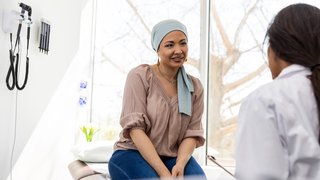All cancer is genetic, but not all cancer is inherited. Cancer is caused by genetic changes, but a significant number of cancers are hereditary due to germline alterations. Some of the most significant advances toward understanding cancer biology have been made by studying rare inherited syndromes such as retinoblastoma and familial adenomatous polyposis.
The UT Southwestern Cancer Genetics program was started in 1992 by pediatric oncologist Dr. Gail Tomlinson as a research program enrolling large numbers of families in a hereditary cancer registry. The goal was to look for genes responsible for hereditary cancer syndromes. This UT Southwestern program was foreshadowed 20 years previously when Drs. Michael S. Brown and Joseph L. Goldstein, also at UT Southwestern, started their search for the genetic cause of familial hypercholesterolemia. Their successful quest led not only to a Nobel Prize (1985) but also to a UT Southwestern culture where future patients were as important as current patients and where discovery of disease causes and cures was the endgame.
Since Dr. Tomlinson started the program, more than 18,600 patients have been seen at UT Southwestern for a cancer genetic analysis and more than 2,430 individuals have been identified as carriers of a genetic mutation. Today, the cancer genetics program is led by Dr. Theodora Ross, an adult oncologist, cancer geneticist, and basic scientist. Because ours is a research based program, our patients continue to not only benefit from the latest advances in clinical testing but also have the opportunity to participate in the future of medicine through the efforts of current UT Southwestern researchers. For example, the program’s analysis of panel tests or whole genome sequences from patients with hereditary cancer has led to the discovery of new cancer predisposition gene mutations and helped us to understand the interaction of multiple genes. For some hereditary cancer families, whole genome sequencing has solved the mystery of what was causing cancer in their families.
The Cancer Genetics team works with all cancer specialty groups at UT Southwestern to identify cancer patients and their family members at high risk for a genetic syndrome. Hereditary cancer is a family matter, so our team also works with family members at Children’s Medical Center of Dallas and Parkland Hospital. Our program is also community-based, with multiple offices throughout the Metroplex, including Moncrief Cancer Institute in Fort Worth, as well as our outreach efforts through telemedicine.










